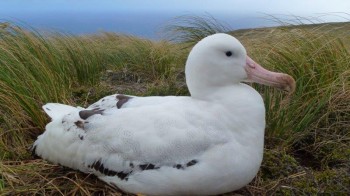The ACAP-listed Antipodean Albatross Diomedea antipodensis, endemic to New Zealand, has been uplisted from Vulnerable to Endangered in the 2017 update of the IUCN Red List of Threatened Species due to very rapid population decreases at both its main breeding sites on the Antipodes and Auckland Island Groups since 2004.
According to a press release by BirdLife International “bycatch in longline fisheries is a major threat, one which is increasing as albatrosses have to fly further to find food - and with more females being accidentally caught and drowned than males there is now thought to be a strong sex imbalance in the population.”
Click here for BirdLife International’s assessment for the Antippodean Albatross.

Antipodean Albatross on Adams Island, Aucklands; photograph by Colin O'Donnell
Because of its worsening conservation status the Agreement added the population of the Antipodean Albatross of the nominate subspecies that breeds on Antipodes Island to the list of ACAP priority populations for conservation management at a meeting of its Advisory Committee, held in Wellington, New Zealand, this September (click here).
Another New Zealand endemic, the ACAP-listed Westland Petrel Procellaria westlandica, has also been uplisted from Vulnerable to Endangered. BirdLife states that “this species qualifies as Endangered because it is restricted to one very small area when breeding, and its habitat is declining in quality due to erosion and landslips.”
Better conservation news is that ACAP-listed Black-browed Albatross Thalassarche melanophris has been downlisted from Near Threatened to Least Concern in the 2017 Red List due to an increasing population trend for a species with a very large range in the Southern Ocean and a large global population estimated by BirdLife International as 1.4 million individuals.
John Cooper, ACAP Information Officer, 20 December 2017

 English
English  Français
Français  Español
Español